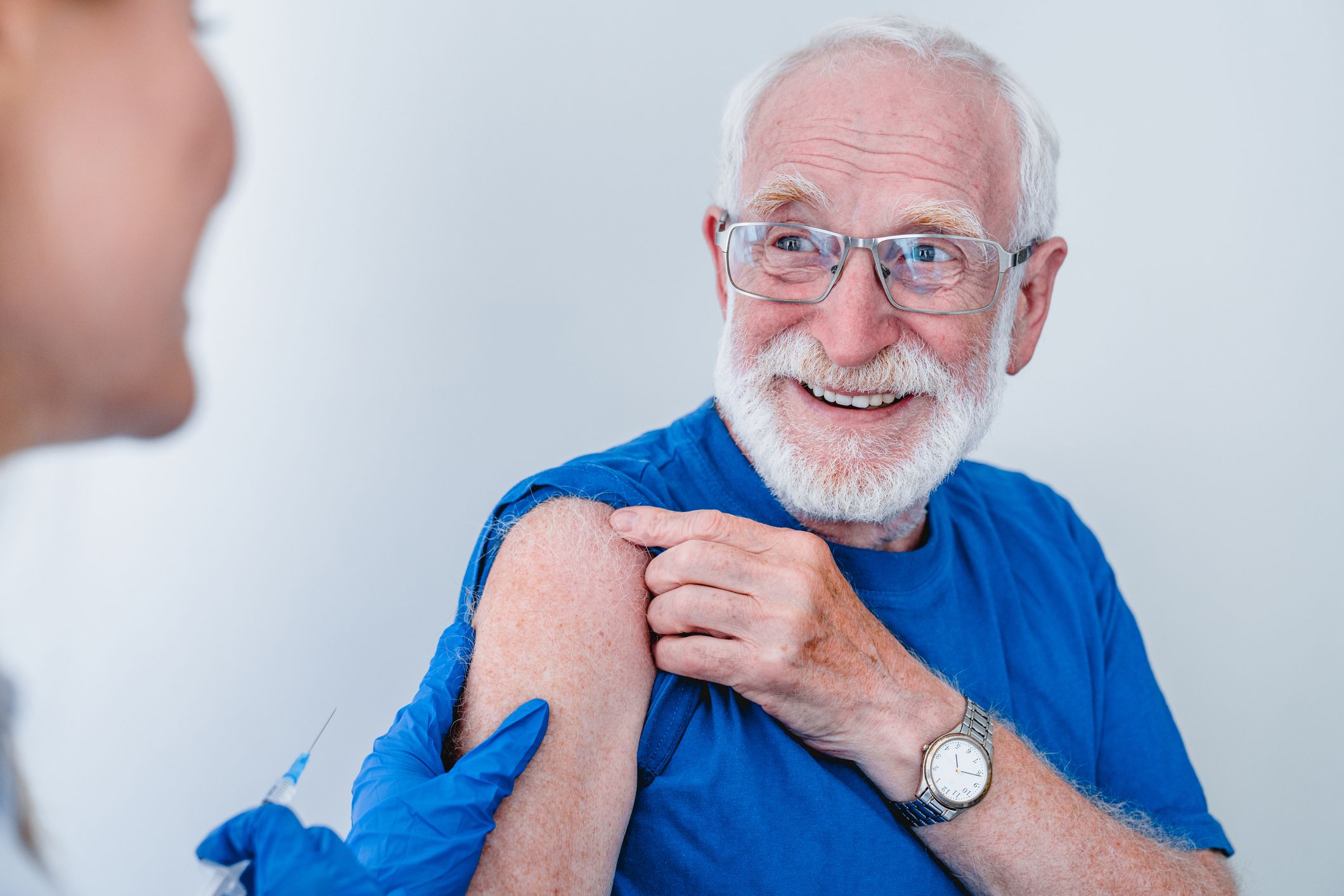Myth or fact: 6 things you need to know about vaccines
No, immunizations aren't linked to autism.
Updated on September 18, 2023

Since the COVID-19 pandemic started in late 2019, childhood vaccination rates have slowly but steadily declined in the United States. About 95 percent of kindergarteners received the measles, mumps, and rubella vaccine (MMR) in the 2019-20 school year, according to the Centers for Disease Control and Prevention (CDC). By 2021-22, it dropped to 93 percent. While that may… Show More
Since the COVID-19 pandemic started in late 2019, childhood vaccination rates have slowly but steadily declined in the United States. About 95 percent of kindergarteners received the measles, mumps, and rubella vaccine (MMR) in the 2019-20 school year, according to the Centers for Disease Control and Prevention (CDC). By 2021-22, it dropped to 93 percent. While that may seem like a small difference, it means about 250,000 school-aged kids are not protected from potentially serious infections like measles.
Some of the difference can be explained by disruptions in life and medical care caused by the pandemic. But another significant factor is vaccine exemptions, sometimes claimed by caregivers who are hesitant about vaccines. Approximately 2.6 percent of kindergarteners had exemptions from state-required shots in the CDC study.
Staying up to date with your child’s immunizations is an important part of keeping kids—and their peers—safe from life-threatening infectious diseases. Here's the truth behind six of the most common immunization myths.
Show Less
Myth #1: Vaccines cause autism
Fact: Large and in-depth studies do not show a connection between vaccines and autism.
The story: In 1998, former doctor Andrew Wakefield published a study in The Lancet linking the MMR vaccine to autism. The study was widely discredited and retracted from publication, while Wakefield was barred… Show More
Fact: Large and in-depth studies do not show a connection between vaccines and autism.
The story: In 1998, former doctor Andrew Wakefield published a study in The Lancet linking the MMR vaccine to autism. The study was widely discredited and retracted from publication, while Wakefield was barred from practicing medicine in the United Kingdom.
Though some still believe there is a connection, numerous studies from major organizations have shown that childhood vaccines—and the MMR vaccine, in particular—are not associated with autism. In 2019, for example, a large Danish study published in the Annals of Internal Medicine examined data from over 600,000 children, including many considered to be at higher risk for autism. Researchers found no evidence of a link between the MMR vaccine and autism, even among high-risk kids.
What’s more, a separate 2019 review published in the Annual Review of Virology not only noted that the MMR vaccine isn’t linked to autism, but vaccine hesitancy has led to new outbreaks and a resurgence of measles in recent years.
Show Less
Myth #2: Childhood vaccines contain mercury (thimerosal)
Fact: Thimerosal, a mercury-based preservative, was removed from all childhood vaccines in 2001, according to the CDC.
The story: Thimerosal had been used to prevent the buildup of dangerous bacteria in vaccine vials. Aside from potential to cause redness at the injection site or, rarely, allergic… Show More
Fact: Thimerosal, a mercury-based preservative, was removed from all childhood vaccines in 2001, according to the CDC.
The story: Thimerosal had been used to prevent the buildup of dangerous bacteria in vaccine vials. Aside from potential to cause redness at the injection site or, rarely, allergic reactions, there’s no evidence that thimerosal caused harm, even before it was removed.
It isn't the same risky kind of mercury found in certain fish (methylmercury), and it has no link to autism. In fact, thimerosal was never even in the MMR vaccine.
Today, the flu shot is the only vaccine available to kids that could contain thimerosal, but not all versions have it.
Show Less
Myth #3: Vaccines aren’t necessary
Fact: Vaccines prevent between four and five million deaths globally every year, according to the World Health Organization. An additional 1.5 million deaths could be avoided if vaccine coverage improved.
The story: Not only do immunizations help the body build a resistance to potentially… Show More
Fact: Vaccines prevent between four and five million deaths globally every year, according to the World Health Organization. An additional 1.5 million deaths could be avoided if vaccine coverage improved.
The story: Not only do immunizations help the body build a resistance to potentially fatal infectious diseases, they make you less likely to pass those illnesses to someone else. Vaccines have virtually eradicated diseases like polio and diphtheria, but without consistent immunization adherence, conditions like these have the potential to reemerge.
Unvaccinated children and adults can spread disease to those who are too young or too medically fragile to be immunized. That means missing even one shot could not only endanger a person’s life, but the lives of those around them.
Show Less
Myth #4: Vaccines cause sudden infant death syndrome (SIDS)
Fact: There is no proven link between the two.
The story: Multiple studies have shown no association between SIDS and vaccines, including a large 2018 review published in Pediatrics, the journal of the American Academy of Pediatrics (AAP). The most common timing of SIDS falls between two and four… Show More
Fact: There is no proven link between the two.
The story: Multiple studies have shown no association between SIDS and vaccines, including a large 2018 review published in Pediatrics, the journal of the American Academy of Pediatrics (AAP). The most common timing of SIDS falls between two and four months of age, which happens to be a time when infants receive several vaccines, meaning the perceived relationship is coincidental rather than causal.
Show Less
Myth #5: It’s not safe to give multiple childhood vaccines at one time
Fact: Evidence shows that’s not the case. Both the AAP and the Advisory Committee on Immunization Practices recommend that kids receive several routine vaccines at once, as long as they have a healthy immune system.
The story: A 2018 study published in JAMA suggests the delivery of multiple… Show More
Fact: Evidence shows that’s not the case. Both the AAP and the Advisory Committee on Immunization Practices recommend that kids receive several routine vaccines at once, as long as they have a healthy immune system.
The story: A 2018 study published in JAMA suggests the delivery of multiple vaccinations doesn’t negatively affect an infant’s immune system. The study assessed hospital visits of 944 children between the ages of 24 and 47 months who had received recommended vaccinations during their first 23 months. Research suggested that early vaccinations didn’t lead to an increased risk of getting infections unrelated to the vaccines (such as respiratory or gastrointestinal infections).
Giving a child several vaccines simultaneously, as well as combined vaccines, has its advantages, including fewer trips to the healthcare provider’s (HCP’s) office and a higher likelihood of completing recommended vaccines on schedule.
Show Less
Myth #6: Only kids need vaccines
Fact: If you thought vaccines were only for little ones, think again.
The story: The National Foundation for Infectious Diseases estimates that 50,000 adults in the United States die of vaccine-preventable diseases each year. Flu-related deaths alone range from 12,000 to 56,000 U.S. adults… Show More
Fact: If you thought vaccines were only for little ones, think again.
The story: The National Foundation for Infectious Diseases estimates that 50,000 adults in the United States die of vaccine-preventable diseases each year. Flu-related deaths alone range from 12,000 to 56,000 U.S. adults every year, according to the CDC.
Here’s a rundown of the vaccines you may need as an adult:
- Influenza: The flu shot is recommended for people 6 months and older.
- Tdap: Adults need one shot of tetanus, diphtheria, and pertussis vaccine (Tdap), followed by a Td or Tdap booster every 10 years.
- Zoster: The shingles vaccine is now recommended for adults 50 years and older.
- Pneumococcal: The pneumonia vaccine is recommended for adults 65 and older, and earlier for people with certain risk factors.
- RSV: As of 2023, there are two vaccines available for the respiratory syncytial virus for adults aged 60 and over. Speak to your HCP about this single-shot vaccination.
- COVID: In September 2023, the CDC recommended an updated COVID booster for everyone aged 6 months and older.
Certain adults may also need vaccines for meningitis, hepatitis, chickenpox, human papillomavirus (HPV), and other conditions. Talk with your HCP about which adult vaccines you may need.
Show Less
KFF.org. Headed Back To School in 2023: A Look at Children’s Routine Vaccination Trends. July 31, 2023.
Seither R, Calhoun K, Yusuf OB, et al. Vaccination Coverage with Selected Vaccines and Exemption Rates Among Children in Kindergarten — United States, 2021–22 School Year. MMWR Morb Mortal Wkly Rep 2023;72:26–32.
Centers for Disease Control and Prevention. Autism and Vaccines. Page last updated December 1, 2021.
DeStefano F, Shimabukuro TT. The MMR vaccine and autism. Annu Rev Virol. 2019;6(1):585-600.
Hviid A, Hansen JV, Frisch M, et al. Measles, mumps, rubella vaccination and autism: A nationwide cohort study. Ann Intern Med. 2019;170(8):513-520.
Callaway E. Brain scans spot early signs of autism in high-risk babies. Nature. 2017.
Centers for Disease Control and Prevention. Thimerosal and Vaccines. Page last updated August 25, 2020.
World Health Organization. Immunization. December 5, 2019.
Moro PL, Perez-Vilar S, Lewis P, et al. Safety surveillance of diphtheria and tetanus toxoids and acellular pertussis (DTaP) vaccines. Pediatrics. 2018;142(1):e20174171.
Centers for Disease Control and Prevention. Sudden Infant Death Syndrome (SIDS) and Vaccines. Page last updated August 14, 2020.
Centers for Disease Control and Prevention. Multiple Vaccinations at Once. Page last updated August 14, 2020.
Glanz JM, Newcomer SR, Daley MF, et al. Association between estimated cumulative vaccine antigen exposure through the first 23 months of life and non-vaccine-targeted infections from 24 through 47 months of age. JAMA. 2018;319(9):906-913.
National Foundation for Infectious Diseases. We The People… Have The Right To Be Vaccine-Preventable Disease Free. July 4, 2019.
Centers for Disease Control and Prevention. Vaccine-Preventable Adult Diseases. Page last updated March 30, 2022.
Centers for Disease Control and Prevention. What Vaccines are Recommended for You. Page last updated May 19, 2023.
Centers for Disease Control and Prevention. Vaccine and Preventable Diseases. RSV Vaccination for Older Adults 60 Years of Age and Over. Last reviewed August 30, 2023.
Centers for Disease Control and Prevention. Respiratory Viruses: Updated COVID-19 Vaccine Recommendations are Now Available. September 12, 2023.
Featured Content

slideshow


video

article

article
